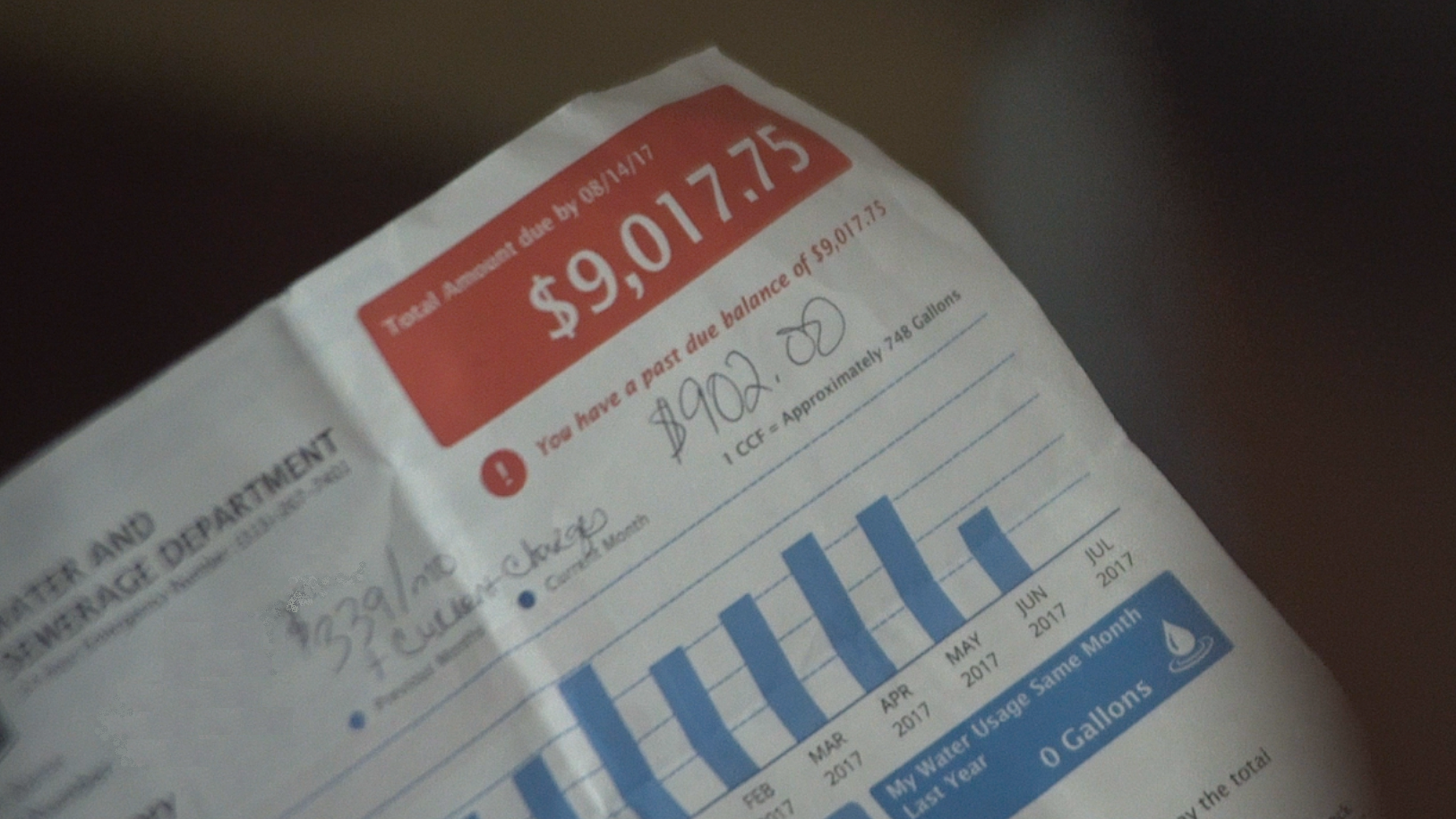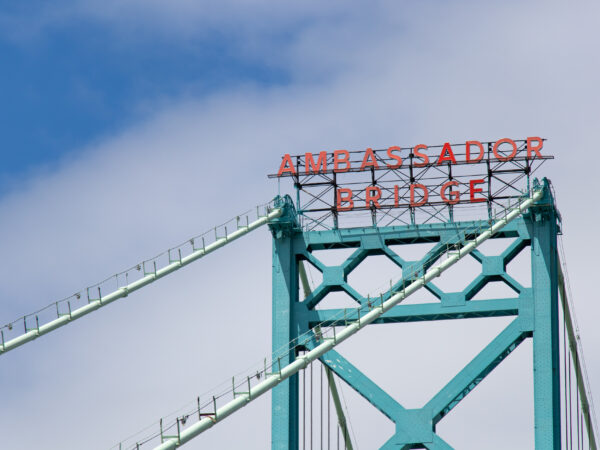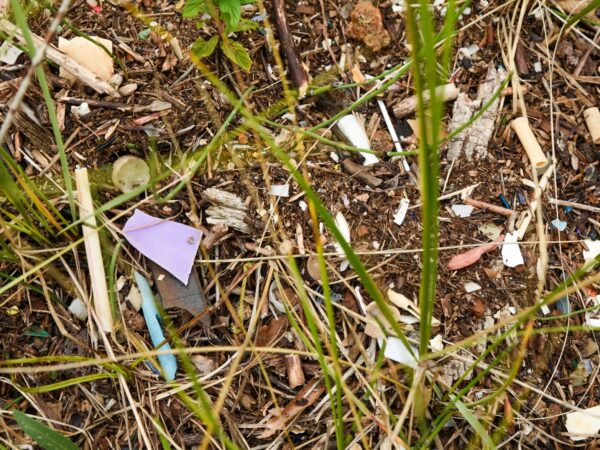
Editor’s note: This article was updated to include Detroit Mayor Mike Duggan’s moratorium on water shutoffs.
As a candidate for governor in the post-Flint water crisis environment, Gretchen Whitmer campaigned on an aggressive water platform.
Among her priorities were ending water shutoffs for people who can’t afford to pay.

Michigan Gov. Gretchen Whitmer speaking at the The Great Lakes and St. Lawrence Governors and Premiers, Photo by Gary Wilson
“I believe water to meet basic needs is a fundamental right and essential to public health and I will work to ensure that everyone has access to a livable quantity of water at an affordable rate,” she said.
She also pledged to deal with the hot-button water withdrawal issue of Nestle extracting Great Lakes water for a nominal fee and selling it at a huge profit.
“We need a way to control the siphoning of water for water bottling and my administration will work to see it done.” she said.
To make good on her campaign promises, Whitmer promised a water ombudsman to handle complaints who would have a “direct line of communication to the governor.”
She also said there would be an increased emphasis on environmental justice.
Now, as governor and after more than a year in office, her campaign pledges are being put to the test.
Public health emergency
In January, a coalition led by the American Civil Liberties Union called on Whitmer “to order a moratorium on the interruption of water service to thousands of Detroit households to end a public health emergency.”
The appeal directly to Whitmer came after the Department of Health and Human Services denied the request saying data was not identified to show a “causal relationship between shutoffs and water-borne disease.”
Whitmer’s chief legal counsel, Mark Totten, responded to the ACLU led coalition in a Feb. 21 letter published in the Detroit News.
Totten began by citing the creation of clean water and environmental justice public advocates as examples of Whitmer’s focus on drinking water as a priority. He cited insufficient data to support use of emergency powers by the governor as the basis for not ending the shutoffs.
Totten closed by saying that DHHS “will continue to review other research and information to assess public-health impacts of shutoffs.”
Great Lakes Now asked the governor’s office and the Department of Environment, Great Lakes, and Energy what role, if any, the public advocates played in the governor’s decision to deny the request to end the shutoffs.
There is “nothing more to share at this time outside of the letter from Mark Totten,” said Whitmer spokesperson Tiffany Brown.
The public advocate positions are housed in EGLE, and the department did not respond to multiple requests to comment.
Backlash
Drinking water rights advocates pushed back hard on the governor’s decision.
“The state has a duty to turn the water back on,” said Jim Olson, an attorney and founder of For Love of Water, a Traverse City water advocacy group, reacting to the governor’s decision in a blogpost.

Jim Olson, President, Photo by flowforwater.org
“Not only was the rejection wrong on moral grounds, it also should never have been the residents’ burden to prove life without water is a crisis,” Olson wrote.
Olson used the opportunity to point out Michigan’s glaring inequity on public water supplies. He called for bottled water companies like Nestle to pay royalties with the money going to a “trust fund for public water and social justice needs.”
“After all, when it comes to our shared public water, we are all citizens of Detroit,” Olson said.
FLOW senior adviser and longtime Michigan water policy expert Dave Dempsey elaborated.
“The (Whitmer) administration’s position on the Detroit water shutoffs is dismaying,” Dempsey said.
“They’re applying the wrong framework. Government has an obligation to protect basic water uses, including sanitation,” according to Dempsey. He cited the public trust doctrine which says Michigan’s water is held in trust by the state for the people as illustrative of the state’s responsibility.
The People’s Water Board Coalition, a largely grassroots coalition that also includes larger activist groups like Michigan Sierra Club and the Natural Resources Defense Council framed the discussion in public health terms and introduced COVID-19, the coronavirus, into the discussion.
The U.S. Department of Health and Human Services and the World Health Organization have declared public health emergencies, the coalition said in a statement.
“It should not take an outbreak to realize that lack of water and sanitation poses a danger to the public health of those impacted by shutoffs, and everyone in our state,” the coalition said.
Citing basic health and safety concerns, the coalition said Gov. Whitmer “must act in the best interests of every person in the state of Michigan.”

Lisa Wozniak, Executive Director, Michigan League of Conservation Voters, Photo by michiganlcv.org
Regarding the shutoffs, Whitmer spokesperson Brown told Great Lakes Now in an email “this is something the Governor’s Office is reviewing as it relates to Coronavirus.”
The threat of coronavirus finally motivated action this week when Detroit Mayor Mike Duggan announced on Monday a moratorium on water shutoffs while COVID-19 remains a concern, Metro Times reported.
The Michigan League of Conservation Voters called on Whitmer to take action but stopped short of calling for an end to the shutoffs.
“As a state, we must do more to address water affordability and rampant water shutoffs in Detroit. We know these shut offs are having enormous impacts on the health and safety of individuals and families throughout the City,” said MLCV executive director Lisa Wozniak in an email response to a Great Lakes Now inquiry.
Wozniak urged Whitmer to “use every tool at her disposal” and said “we continue to stand with impacted citizens demanding more from our leaders.”
Spokesperson Nick Dodge added that “if we want to address this problem in the long-term it will take legislation and the Legislature will have to act.”
Lansing-based Michigan Environmental Council, a policy-focused organization, did not respond to a request for comment.
Stonewalling and delay
Detroit Free Press columnist Nancy Kaffer sees a pattern that harkens back to the Flint water crisis.
It’s a “weird round robin of responsibility that accompanies any systemic failure,” Kaffer wrote recently in a column connecting handling of shutoffs to Flint and other crises.
“You’ll find stonewalling and delay, as the people in charge scramble to explain why they are not actually the ones who can address the problem,” Kaffer said.
An example could be Whitmer’s legal counsel Totten telling the ACLU to contact Michigan’s legislative leaders with ideas to reform laws on water shutoffs.
FLOW’s Dempsey gave Gov. Whitmer credit for recognizing the need early in her tenure for public water and environmental justice advocates who could make an impact for people suffering from water injustice.
“But these positions are only as meaningful as the actions they compel,” Dempsey said, “and that can only happen if the governor gives the advocates clout.”
“It’s hard to see that so far in the water shutoff crisis,” Dempsey said.
Featured Image: $9,000 DWSD water bill, Photo courtesy of Bill Kubota




